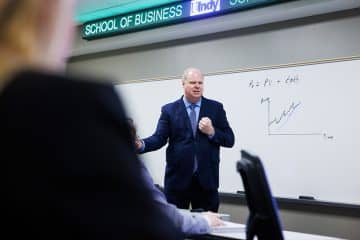How to Prepare for the MBA Admissions Process
The MBA has earned its place as a highly sought-after qualification, admired and revered by employers and professionals alike. As the global business landscape becomes increasingly competitive and dynamic, individuals with an MBA on their résumé gain a distinct advantage. These programs provide a rigorous curriculum that hones such critical skills as leadership, strategic thinking, problem solving and communication. More importantly, they offer valuable networking opportunities with industry leaders, entrepreneurs and other like-minded individuals, fostering an environment conducive to collaborative learning and professional growth.
The decision to pursue a Master of Business Administration holds the promise of transforming your career trajectory, broadening your skillset and opening doors to remarkable opportunities in the business world. As you embark on this life-changing pursuit, it’s essential to approach the MBA admissions process with a combination of enthusiasm, preparation, and a strategic mindset. In this comprehensive guide, we will give you helpful tips and strategies that will not only maximize your chances of gaining admission to a top-notch business school but also empower you to stand out as an exceptional candidate.
Research and Identify Your Target Programs:
One of the first steps in your MBA application journey is to research and identify the programs that align with your career goals and aspirations. Take the time to explore various MBA programs, considering factors such as curriculum, faculty expertise, reputation, location and specialization options. This will help you create a shortlist of programs that best suit your needs.
The MBA program at Harding University is fully online and customizable to fit your needs. In less than two years, you could be fully prepared to take the next step in your career by adding an MBA to your résumé.
Jacob and Julia Stephenson graduated from Harding University’s MBA program in 2018. “For us, there was no other choice of MBA program but Harding University,” they said. “Online classes provided necessary flexibility for us to stay involved in our responsibilities … However, the Christian perspective and commitment to business ethics … is what we valued the most. Receiving top-notch business training with a diverse group of students while putting Christian values first was incredibly beneficial and rewarding, and we have already seen it pay dividends in our careers.”
Understand the Admissions Requirements:
Each MBA program has its own specific admissions requirements and criteria. Familiarize yourself with these requirements thoroughly to ensure that you meet or exceed them. Common prerequisites include academic transcripts, standardized test scores (such as the GMAT or GRE), letters of recommendation, essays or personal statements, and interviews. Carefully review each program’s website and admission guidelines to stay informed.
Prepare for the Standardized Tests:
Standardized tests, such as the GMAT or GRE, play a crucial role in the MBA admissions process. Begin your preparation early by taking practice exams to assess your strengths and weaknesses. Consider enrolling in a test preparation course or hiring a tutor to help you improve your scores. Give yourself ample time to retake the exam if necessary. Remember, a strong test score can significantly enhance your application.
Build a Strong Academic Profile:
While standardized test scores are important, a strong academic profile is equally crucial. MBA programs often consider your undergraduate GPA and the rigor of your coursework. If your academic record is not strong, consider taking additional courses or pursuing a post-baccalaureate program to demonstrate your commitment and ability to handle the academic rigor of an MBA. Strive to excel in your coursework and showcase your intellectual abilities.
Like many schools, Harding University’s MBA program does not require a GRE or GMAT score to be considered. With no application fee, you could get started today!
Cultivate Strong Professional Relationships:
Letters of recommendation are an essential part of your MBA application. Cultivate strong professional relationships with supervisors, mentors or professors who can speak to your skills, accomplishments, and potential. Maintain regular communication with them and provide them with ample time to write thoughtful and personalized letters on your behalf. Choose recommenders who can attest to different aspects of your abilities and character.
Craft Compelling Essays:
Your essays or personal statements provide an opportunity to showcase your unique qualities, experiences, and aspirations. Take the time to craft compelling narratives that highlight your strengths, demonstrate self-awareness, and explain why you are a good fit for the program. Be authentic, and avoid using generic or clichéd language. Have multiple people review your essays for feedback and make necessary revisions to ensure clarity and coherence.
Showcase Leadership and Extracurricular Involvement:
MBA programs value candidates who have demonstrated leadership potential and a commitment to making a positive impact in their communities. Engage in extracurricular activities, volunteer work, or community initiatives to showcase your leadership skills and involvement. This not only enhances your application but also provides you with valuable experiences and networking opportunities. Highlight any notable achievements or experiences that reflect your ability to lead and contribute to a team.
Prepare for the Admissions Interview:
If your application is shortlisted, you may be invited for an admissions interview. Prepare for the interview by researching common interview questions and practicing your responses. Showcase your knowledge about the program, articulate your career goals clearly, and demonstrate your enthusiasm for joining the MBA program. Dress professionally, and be confident (yet humble) during the interview. Remember, the interview is an opportunity for the admissions committee to get to know you beyond your application materials.
Plan Ahead and Stay Organized:
The MBA admissions process can be overwhelming, with multiple deadlines, documents, and requirements to manage. Create a detailed timeline and checklist to stay organized. Start well in advance to avoid rushing through the process. Keep copies of all documents and maintain a record of submission dates to ensure a smooth and timely application. Use technology tools or project management apps to stay on top of deadlines and tasks.
Remember, gaining admission to a reputable MBA program is a competitive process, but with careful preparation and strategic planning, success is within your reach. Stay focused, leverage your strengths, and put in the necessary effort to present yourself as a compelling candidate. The journey towards an MBA is not just about getting into a program; it is also an opportunity for personal growth and self-discovery.





